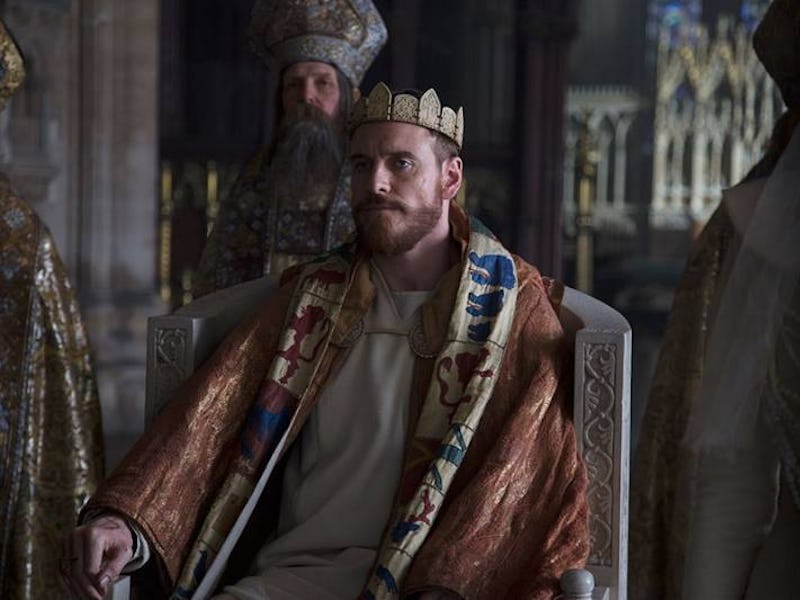What 'Macbeth' Shows About the Future of Shakespeare Films
The Michael Fassbender 'Macbeth' film stands as a lesson to filmmakers moving forward.

If you haven’t seen newcomer Justin Kurzel’s gritty, Game of Thrones esque take on Macbeth, featuring Michael Fassbender in one of the best performances of his formidable career, first of all, see it! Second, it’s going to be a game changer for how to adapt Shakespeare going forward.
As Kurzel told Inverse, he wanted Macbeth to feel like a medieval Western. With his wide shots, fast cuts, and brutal, dreamlike battle sequences, he certainly achieved his goal: Shakespeare has never felt so fresh and timeless. Modernizing The Bard might seem like a no-brainer — after all, with themes like revenge, jealousy, deception, witchcraft, sex, blood, madness, and murder, Macbeth isn’t exactly fading out of style anytime soon. But modernizing Shakespeare isn’t as easy as it looks — and there’s a whole cinematic graveyard of pitfalls to prove it. Future Shakespeare adaptors could stand to learn a few lessons from this triumphant Macbeth.
Stick to the script
Kenneth Branagh’s 1993 take on Much Ado About Nothing is not a bad adaptation — in fact, it’s highly entertaining, featuring Keanu Reeves as the villainous Don John in the most batshit crazy, delightfully daffy performance of his career. Reeves was clearly so jazzed about proving himself as a real actor that he took the opportunity to go balls-to-the-wall in this film, apparently presuming Branagh would tell him when to stop. Luckily for the world, Branagh never did. Reeves might be sweet in John Wick, but a true Reeves fan trumpets his absurd Shakespearean turn.
Branagh went so far as to fuel Reeves’ fire, embellishing Shakespeare’s spare script with scenes of Keanu Reeves looking evil while lounging around shirtless in leather pants and getting massaged.
This isn’t to criticize that stage direction — everything about it is amazing, in fact — but it doesn’t do any favors in getting us to take Reeves or the role of Don John seriously. Even though we’re glad he didn’t, Branagh should have realized that sometimes with adapting Shakespeare, less is more.
In his spare, less-is-more spin on Macbeth’s witchy Weird Sisters, Kurzel takes characters that — like Don John — could come across as cartoonish and campy and he instead infuses them with a chilling, unsettling air. Unlike Don John, Macbeth’s witches are impossible to laugh off.
Don’t be afraid to embellish
This might sound like it contrasts the point about Branagh’s questionable decision to embellish his film with leather pants and evil massages. To quantify: embellish with care. There’s a way to do it while still sticking to the spirit of the script. Shakespeare’s notoriously light hand with stage directions leave lots of room to play around. Sex is an area that’s particularly ripe for this: Shakespeare’s plays are full of it, cloaked within the flowery language.
Just look at this exchange between Hamlet and Ophelia:
HAMLET: Lady, shall I lie in your lap?
OPHELIA: No, my lord.
HAMLET: I mean, my head upon your lap? Do you think I meant country matters?
OPHELIA: I think nothing, my lord.
In Shakespeare’s day, “Nothing” used to be slang for “vagina”. It gives Much Ado About Nothing a whole different slant — one that Joss Whedon used as a jumping point for his adaptation, which is just as good as Kurzel’s Macbeth. Reading between the lines in the play, it feels organic and natural to add in sex between Beatrice and Benedick.
Like Whedon, Kurzel follows the same trail in Macbeth when Lady Macbeth literally seduces Macbeth into their murderous schemes. This is different from Branagh’s decision to add leather pants and evil massages because these embellishments are consistent with the characters and their actions — they’re not just tossed in because somebody thought it might look cool.
Modern doesn’t really have to really mean modern
In the ‘90s and early 2000s, putting Shakespeare in modern-day high school settings was all the rage: Before he reassessed his life choices, invigorated his career, and became awesome on Penny Dreadful, Josh Hartnett took an admirable if unsuccessful stab at making Othello’s Iago a slippery, conniving teenage jock named Hugo.
And of course, we can’t forget that time Ethan Hawke took an equally admirable yet baffling stab at turning Hamlet into a pants-sagging, beanie-wearing, peach-fuzz crustache-sporting teenager waxing existentially while strolling through the aisles of Blockbuster.
These films are entertaining, but they didn’t work because mixing Shakespearean language with a modern setting came across as clunky. Adaptations don’t have to be literally modern in order to feel modern. Macbeth is clearly a period piece, yet it feels more modern than either of these films because it uses a setting that won’t feel dated a few years later (RIP Blockbuster) and it’s clearly a product of the modern era: The aesthetic of its stylistic battle sequences would not exist without Game of Thrones and 300.
It pulses with modern influences even when swords clash and horses gallop.
Modernizing Shakespeare while sticking to its spirit is no easy task, but future filmmakers would do well to follow the guidelines set by Kurzel — and Whedon — when they take their turns at tackling The Bard. Now bring on the gritty, timeless King Lear rendition we’ve been waiting for.